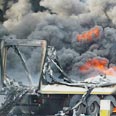
Belfast in 1995
צילום: איי פי
Peace now, in Belfast
Yehuda Litani hopes that Northern Ireland’s success can be duplicated in our region
BELFAST – You look up to the sky and something is missing there – there are no helicopters. Their tireless 24-hours-a-day buzz is gone. Belfast 2008 looks just like any other British city these days; it’s almost boring.
I walk around the streets of this formerly torn city and I can’t believe my eyes: Tourists are frequenting areas that only a few years ago constitute life threatening danger. A tour guide points to a graffiti and says: This is a painting from the old days of the Protestant underground organization, which is almost inactive. And here we had a butcher shop where the Catholic underground placed a bomb and many people were killed. But now, as you can see, everything is quiet.
The grey army and police jeeps that used to patrol city neighborhoods are nowhere to be seen. Instead, the town is filled with cranes towering over large construction sites. The signs of an extraordinary construction boom can be seen everywhere.
The commercial center is lively. During the tense days of the past people were searched at the entrance to every store. The area was fenced and armed police officers and soldiers were present at all hours of day and night. Now we see children with their parents and many immigrants from eastern Europe, mostly Poles, who enjoy the shopping centers despite the high prices. There are no police officers, no security guards, and no fences.
Belfast is flooded by night clubs and new pubs where many joyous youngsters gather keep on being opened.
“I still remember the terrible violence in the city,” I tell my cab driver, and he replies that there is no way that the violence will return. “We live in a new era.”
Radical change
Experts on the Northern Ireland conflict warn that undercurrents still exist that could point to a weakening or even possible collapse of the agreement. They point to the weakness of the protestant ruling party and the old age and frail health condition of its leader, which may force him to resign and could create political instability.
A Catholic priest that I met tells me about the tensions that still persist between Catholics and Protestants in his neighborhood, but I tell him that I visited the neighborhood during the toughest days of violence and there is no comparison between then and now.
I travel through streets that once upon a time were replete with violence, despair, and neglect and I tell myself that if such radical change happened here, maybe, just maybe, it’s possible in our region too, despite the terrible despair and terrible violence and ongoing bloodshed.
This is how it used to be in Northern Ireland as well. In the old days, people in Belfast spoke to me about emigrating to Scotland or to London. They too said there was no chance. Yet in Belfast I realized that we must not abandon hope.










